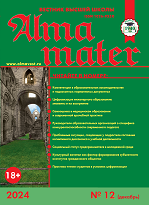Sergey V. Reznik, Dr. Sc. (Engineering), Professor, Head of Department SM-13, Bauman Moscow State Technical University, e-mail: sreznik@bmstu.ru
The issues of training specialists with higher technical education are considered in the light of the need to achieve national technological sovereignty. Russia’s withdrawal from the Bologna system initiated another reform of higher education. The content, forms and duration of education are being reviewed, and ways to reform technical universities are being discussed. In this paper, a comparative analysis of three models of technical universities is carried out — research, entrepreneurial and full innovation cycle. Possible changes in the setting of training sessions, the position of students and teachers are highlighted. It is noted that it is necessary to preserve the experience of domestic engineering education and a balanced attitude to the reform of universities in order to exclude a critical decline in the role of scientific schools and departments. The subjectivity of universities, as well as the loyalty of students and staff, will primarily be determined by the presence of advanced scientific schools, outstanding scientists, and not only the state of the campus and the commercialization of research and development results. The significant difference between the tasks facing departments and scientific and educational centers in personnel training is shown. Scientific and educational centers are aimed at research and development, and the educational process in them is of a secondary nature. In the vast majority of scientific and educational centers, do not have high-class working scientists in their composition, and the further they are from the departments, the less chance they have to create advanced scientific and technical products. In this regard, the fascination with clustering and the creation of research and educational centers independent of departments at universities from the standpoint of achieving genuine technological sovereignty is futile.
Keywords: higher education, technological sovereignty, technical university, department, scientific and educational center, individual educational trajectories
References
1. Aerospace education in Russia. Staffing of the military-industrial complex. D.A. Kozorez (ed.). Moscow: Publishing House of MAI, 2021. 264 p.
2. Aerospace education in Russia. Features of personnel training in the context of global changes. D.A. Kozorez (ed.). Moscow: Publishing House of MAI, 2022. 160 p.
3. Aerospace education in Russia. Responding to the challenge of time. D.A. Kozorez (ed.). Moscow: Publishing House of MAI, 2023. 216 p.
4. Higher education in Russia: An essay on the history before 1917. / A.Ya. Saveliev, A.I. Momot, V.F. Khoteenkov et al. V.G. Kinelev (ed.). Moscow: Research Institute of Higher Education Press, 1995. 352 p.
5. Fedorov, I.B., Baltyan, V.K. Formation and development of the university technical education system in Russia. Higher education in Russia. 2012. Vol. 21. No. 11. P. 30–39.
6. The future of engineering education: Collection of scientific articles. A.A. Alexandrov and V.K. Baltyan (eds). Moscow: Bauman MSTU Press, 2016. 268 p.
7. Tatur, Yu.G. Educational process in higher education: methodology and design experience. Moscow: Publ. House of Bauman MSTU, 2009. 265 p.
8. Baidenko, V.I. The Bologna process: A course of lectures. Moscow: Logos, 2004. 175 p.
9. The Bologna process: the search for commonality of European higher education systems (Tuning Project). V.I. Baidenko (ed.). Moscow: ICPKPS, 2006. 211 p.
10. The Bologna process and its significance for Russia. Integration of higher education in Europe / V.A. Belov, M.A. Entin, G.I. Gladkov et al. K. Pursiainen and S.A. Medvedev (eds). Moscow: RECEP, 2005. 199 p.
11. Main trends in the development of higher education: global and Bologna dimensions. V.I. Baidenko (ed.). Moscow: ICPKPS, 2010. 352 p.
12. The Bologna Process: the results of the decade. V.I. Baydenko (ed.). Moscow: ICPKPS, 2011. 444 p.
13. Baidenko, V.I. The Bologna process on the eve of the third decade // Higher education in Russia. 2018. Vol. 27, No. 11. P. 136-148.
14. Badarch, D., Sazonov, B.A. Relevant issues of international harmonization of educational systems: Monograph. Moscow: UNESCO Bureau in Moscow, THEIS, 2007. 190 p.
15. Sazonov, B.A. The Bologna process: current issues of modernization of Russian higher education: Textbook. 2-nd ed., add. and corr. Moscow: Publ. House of the Bauman MSTU, 2007. 156 p.
16. Engineering pedagogy: modern technologies of engineering education / N.S. Vatolkina, V.Ya. Gorbunov, E.A. Gubareva et al. Moscow: Lan’, 2022. 232 p.
17. Reznik, S.V., Mikhailovsky, K.V., Shafikova, I.R. Advanced training of specialists for space construction. Alma mater (Vestnik vysshey shkoly). 2023. No. 6. P. 5–11. DOI: 10.20339/AM.06-23.05
18. Comparative education research: approaches and methods. M. Bray, B. Adamson, M. Mason (eds). 2-nd edition. Hong Kong: Comparative Education Centre, University of Hong Kong; Springer, 2014. 453 p.
19. Modernization of Russian education. Challenges of the new decade / V.V. Galkin, D.S. Zueva, V.E. Volkov et al. A.A. Klimov (ed.). Moscow: Delo, 2016. 104 p.
20. Romanov, E.V. Evaluating the effectiveness of Russian universities: is it necessary to change the paradigm? Education and Science. 2021. Vol. 23. No. 6. P. 84–125.
21. Eagleton, T. The slow death of the university. E. Buchkin (transl. from Eng.). Alma mater (Vestnik vysshey shkoly). 2016. No. 2. P. 109–112.
22. Clark, B. Creation of entrepreneurial universities. Moscow: Publishing House of the Higher School of Economics, 2019. 240 p.
23. Yurganov, A.A., Bozhenkina, S.A., Popadin, D.S. ‘Open University’: conceptualization and schematization of the university 3.0 from the perspective of a system-based research approach (part 1). Alma mater (Vestnik vysshey shkoly). 2024. No. 2. P. 9–16. DOI: 10.20339/AM.02-24.09












.png)






